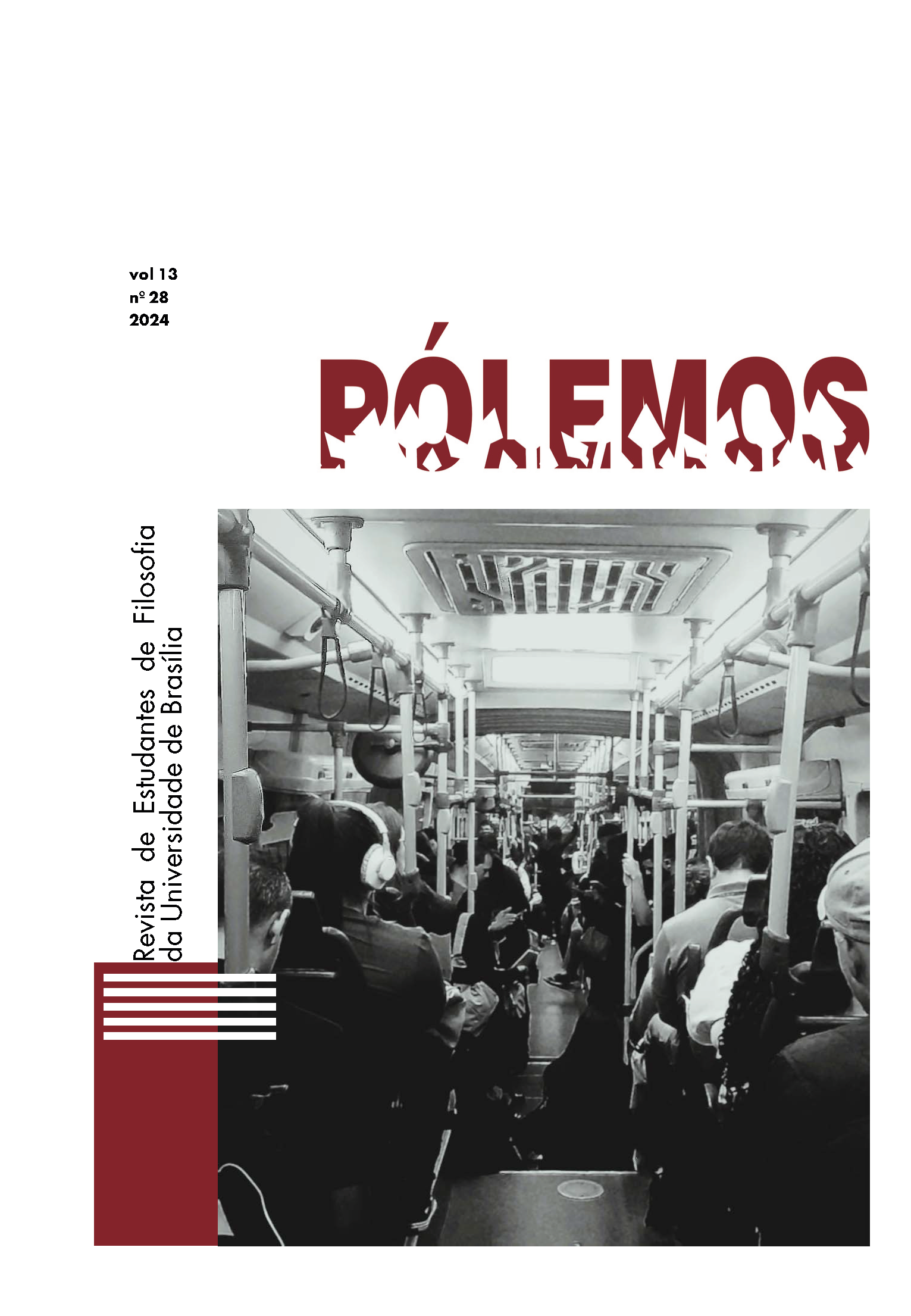ALBERT CAMUS AND THE NEOCOLONIAL QUESTION
dialogue between political, artistic and social thoughts
DOI:
https://doi.org/10.26512/pl.v13i28.53597Keywords:
Albert Camus. Stranger. Neocolonialism.Abstract
Albert Camus was recognized as a philosopher engaged in political and social issues of his time, which took into account the need for liberation of the Franco-Algerian people and the guarantee of rights and citizenship to Algerian Arabs. His philosophy had as its central object the discussion about the absurdity of human existence and its repercussions in different spheres of social life, such as the political and legal levels. My objective is to present the introduction of the neocolonial issue in the thought of Albert Camus, with a view to producing a philosophy that simultaneously dialogues with political, artistic and social categories. His position is controversial and the criticisms made at his time remain valid: by defending the rapprochement between Franco-Algerians and Arabs, instead of complete Algerian independence, the philosopher puts himself in contradiction with his own principles – which defended permanence and fidelity to the debate on the problems of their homeland.
Downloads
References
ABBAGNANO, Nicola. Dicionário de filosofia. Trad. Alfredo Bosi. 5. ed. São Paulo: Martins Fontes, 2007.
ALTER, André. De « Caligula » aux « Justes »: de l'absurde à la justice. In: LÉVI-VALENSI, Jacqueline (Org.). Les critiques de notre temps et Camus. Paris: Garnier, 1970, pp. 18-28.
BARRETO, Vicente. Camus: vida e obra. 2. ed. Rio de Janeiro, 1991.
CAMUS, Albert. À Combat: éditoriaux et articles, 1944-1947. Paris: Folio Essais, 2013.
CAMUS, Albert. Chroniques algériennes. Paris: Gallimard, 1958.
CAMUS, Albert. Estado de sítio. Trad. Alcione Araújo e Pedro Hussak. 2. ed. Rio de Janeiro: Record, 2018.
CAMUS, Albert. Lettres à un ami allemand. Paris: Folio Essais, 1991.
CAMUS, Albert. O avesso e o direito. Trad. Valerie Rumjanek. 10. ed. Rio de Janeiro: Record, 2020a.
CAMUS, Albert. O Estrangeiro. Trad. Valerie Rumjanek. 40. ed. Rio de Janeiro: Record, 2016.
CAMUS, Albert. O homem revoltado. Trad. Valerie Rumjanek. 14. ed. Rio de Janeiro: Record, 2020b.
CAMUS, Albert. O mito de Sísifo. Trad. Ari Roitman e Paulina Wacht. 19. ed. Rio de Janeiro: Record, 2020c.
EVANS, Martin; PHILLIPS, John. Algeria: anger of the dispossessed. New Haven: Yale University Press, 2008.
FIGUEIREDO, Eurídice. Albert Camus entre guerras: de Combat a O primeiro homem. Organon: Revista do Instituto de Letras da UFRGS, v. 32, n. 63, p. 1-18, 2017. Disponível em: https://seer.ufrgs.br/index.php/organon/article/view/76260/46108. Acesso em 17 out. 2024.
FORTIER, Paul A. Une lecture de Camus: la valeur des éléments descriptifs dans l'oeuvre romanesque. Paris: Éditions Klincksieck, 1977.
HASAN, Ashraful. Colonial implications in Albert Camus’s The Outsider. International Journal of English Language, Literature and Humanities, v. 2, n. 4, p. 110-118, ago. 2014. Disponível em: https://ijellh.com/papers/2014/August/9-110-118-August-2014.pdf. Acesso em 17 out. 2024.
JOSÉ, Caio Jesus Granduque. A construção existencial dos direitos humanos. 194 f. Dissertação (Mestrado em Direito) – Faculdade de História, Direito e Serviço Social, Universidade Estadual Paulista, Franca, 2009. Disponível em: http://hdl.handle.net/11449/89867. Acesso em 17 out. 2024.
JOSÉ, Caio Jesus Granduque. Albert Camus e o direito: itinerário libertário para uma filosofia jurídica. 314 f. Tese (Doutorado em Direito) – Faculdade de Direito, Universidade de São Paulo, São Paulo, 2014. Disponível em: https://www.teses.usp.br/teses/disponiveis/2/2139/tde-16102015-161640/pt-br.php. Acesso em 17 out. 2024.
LEBLANC, John Randolph. Art and politics in Albert Camus: beauty as defiance and art as a spiritual quest. Literature & Theology, v. 13, n. 2, p. 126-148, jun. 1999. Disponível em: https://www.jstor.org/stable/23925254. Acesso em 17 out. 2024.
LÉVI-VALENSI, Jacqueline. Camus et le théâtre. In: LÉVI-VALENSI, Jacqueline (Org.). Les critiques de notre temps et Camus. Paris: Garnier, 1970, pp. 17-18.
LÉVI-VALENSI, Jacqueline; ABBOU, André (Orgs.). Cahiers Albert Camus 3: fragments d'un combat (1938-1940) – Alger Républicain. Paris: Gallimard, 1978.
MACHADO, Antônio Alberto. O direito e a ética do absurdo: uma leitura de Albert Camus. In: CASARA, Rubens; LIMA, Joel Corrêa de (Coords.). Temas para uma perspectiva crítica do direito: homenagem ao Professor Geraldo Prado. 2. ed. Rio de Janeiro: Lumen Juris, 2012, pp. 177-187.
MCCARTHY, Patrick. Camus: The Stranger. Cambridge: Cambridge University Press, 2004.
O’BRIEN, Conor Cruise. Albert Camus of Europe and Africa. London: Penguin Books, 1970.
ONFRAY, Michel. L'ordre libertaire: la vie philosophique d'Albert Camus. Paris: Flammarion, 2012.
RIBEIRO, Hélder. Do absurdo à solidariedade: a visão do mundo de Albert Camus. Lisboa: Estampa, 1996.
SAMPAIO, Leandson Vasconcelos. O pensamento mediterrâneo-libertário de Albert Camus. Revista Lampejo, v. 8, n. 2, p. 206-213, 2019. Disponível em: https://revistalampejo.org/index.php/lampejo/issue/view/17/306. Acesso em 17 out. 2024.
SILVA, Gabriel Ferreira da. "Esculpir em argila": Albert Camus – uma estética da existência. São Paulo: Educ, 2014.
YAZBEK, Mustafa. A revolução argelina. São Paulo: UNESP, 2010.
Downloads
Published
Issue
Section
License
Copyright (c) 2024 PÓLEMOS – Revista de Estudantes de Filosofia da Universidade de Brasília

This work is licensed under a Creative Commons Attribution-NonCommercial-NoDerivatives 4.0 International License.
Todos os trabalhos que forem aceitos para publicação, após o devido processo avaliativo, serão publicados sob uma licença Creative Commons, na modalidade Attribution-NonCommercial-NoDerivatives 4.0 International Public License (CC BY-NC-ND 4.0). Esta licença permite que qualquer pessoa copie e distribua a obra total e derivadas criadas a partir dela, desde que seja dado crédito (atribuição) ao autor / Ã autora / aos autores / às autoras.


